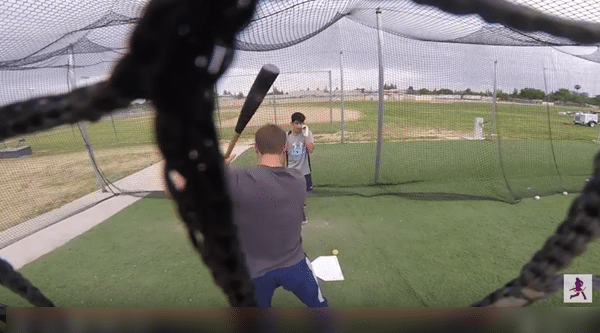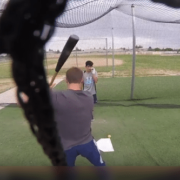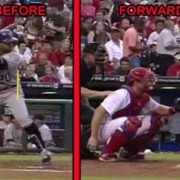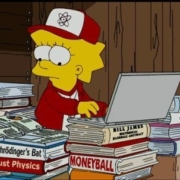Part-1: Dramatically Cut Your Hitter’s Learning Curve In Half By Doing This…
Dramatically Improve HOW Your Hitters Learn By Listening In On A Local Lesson of Mine
- Part 1 – [You Are Here] Dramatically Cut Your Hitter’s Learning Curve In Half By Doing This…
- Part 2 – Dramatically Reduce Time To Impact Without Losing Power
- Part 3 – How To Develop Powerful Wrist Snap Like Hank Aaron (Is Devastating For Pitchers)
Here’s what I have for you…
The above video is Part-1 of a three part series showcasing a local lesson of mine.
The objective of this video series is to share with coaches – literally – an “over-the-shoulder” look at how I do a local lesson. More on this in a moment…
Zack is a 14-year-old hitter from Visalia, California, which is approximately an hour drive from me, one way. And this is the first time I worked with him since about a year ago. We’ve had about half a dozen session together in total.
Before we started this session, Zack was having a challenge with hitting line drives. He was either hitting the ball on the ground or non-productive balls in the air.
DISCLAIMER about the video:
- Fortunately the video quality is great because Dad used his GoPro, but unfortunately I wasn’t mic’d up, so the audio isn’t like some of my other videos.
- We’re at a public High School on a Saturday afternoon, so there are other team noises, bird sounds, emergency vehicles, etc. going on in the background that can be distracting.
Now, what’s in this Part-1 video?
Let me expand on the video’s objective and how it can benefit coaches…
I get questions every week on how I’d run a practice or one-on-one session. This is an over-the-shoulder look. The main objective of this video series is to demonstrate how I use some of the “sticky” coaching principles covered in this post, and in my new book The Science Of Sticky Coaching: How To Turn Ordinary Athletes Into Extraordinary.
Sadly, a few coaches on the socials will be overly critical of this hitter, and I’m asking you to suspend judgement. The purpose of this video IS NOT about being overly critical of the hitter’s swing, it’s about the demonstration and use of sticky coaching principles.
With that being said, swing suggestions are welcome, but be nice coaches. Also, coaching suggestions are welcomed…but again, be nice.
Now, for those coaches looking to learn and help their hitters get better…ONWARD!
A typically lesson I do, is organized like the following, from start to finish (I’ve cut some parts out of this video for the sake of brevity):
- Dynamic warm-up,
- Beginning Ball Exit Speed readings,
- Record and analyze current swing,
- Lesson, and
- Ending Ball Exit Speeds readings.
What you can look out for in above video
- Talking about how to pick the right bat size (1-3:30 min mark),
- Showing him Miguel Cabrera’s landing position top hand and elbow positioning on my phone after video analysis of Zack’s swing (about 7-min mark),
- Working on Zack’s top hand Finger Pressure (about 8-min mark),
- Switching bats – over-loading with heavier end loaded bat with goofy PRX knob (about 13-min mark), and
- Teasing the Part-2 video where we talk about lowering Zack’s hands to not get above armpit line to landing – and the benefits of (about 15:30-min mark).
Also, when it comes to sticky coaching principles, notice how I:
- Move the tee positioning around after every swing (both high/low and inside/outside),
- Vary soft toss heights and depths,
- Vary mechanics on certain swings in a 5-swing round (I call these Varied Rounds), or practice one thing the whole round (I call these Block Rounds),
- Ask quite a few feel, visual, and/or audio feedback questions AFTER round is over (think of it like a hitting quiz),
- Keep my mouth shut during the 5-swing round (little to no feedback from me),
- Don’t make Zack take a lot of swings during our time together,
- Have him change his bat size during rounds, and
- Work with him on simplifying the juggling of a couple different mechanical cues.
- Fix Your Child’s Fear of the Ball Fast: Proven Hitting Drills to Stop Flinching at Pitches—Trusted by Top Youth Baseball Coaches - July 12, 2025
- Fix Your Little Leaguer’s Hitting Slump Fast – Proven Confidence Drills & Mental Reset Tools (Used by Top Youth Baseball Coaches) - July 9, 2025
- Best Hitting Drills for 8-Year-Olds (2025): Fix Swing Flaws Fast with This MLB-Trusted Youth Baseball System—At-Home, Step-by-Step, and Built for Game-Day Confidence - July 5, 2025













No video attached
Sorry James, should be there now.
This was awesome Joey! Thanks.
~DM
You got it Djura, thank you!
When should the finger pressure end or turn off?
Jonathon, starts when hitting picks up stride foot, and ends into the swing follow through (well past impact).
Joey… I like the picking up stride foot starting point but I would also include at the rib cage furthest pull or turn… perhaps I’m wrong but you may find that interesting… perhaps not… what say you. Your thoughts are always appreciated… later…
One last thought since its around the same area… I usually feel like my top arm is going the opposite way than my rib cage… so it feels like it’s gets sucked in like those old machine pitch machines like the ones with the two wheels… just a thought…
~DM